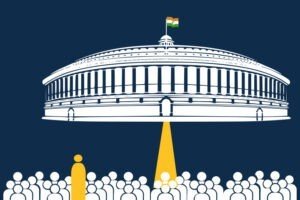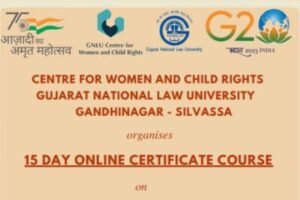Advanced Training Program on Digital Rights & Digital Equity
Course Instructor: Ms. Anamika Shukla, Assistant Professor of Law, Gujarat National Law University, Gandhinagar
Course Overview:
In today’s interconnected world, digital technologies have become ubiquitous, permeating every aspect of our personal and professional lives. From social media and online shopping to remote work and e-governance, the digital sphere shapes how we communicate, transact, and interact with the world around us. However, alongside the unprecedented opportunities presented by digital advancement, there also exist significant challenges related to digital rights and equity.
The need for a course on Digital Rights & Digital Equity stems from the growing recognition of the complex and multifaceted issues surrounding digital governance and inclusion. As digital technologies continue to evolve at a rapid pace, it has become increasingly clear that individuals and institutions alike must possess a deep understanding of digital rights principles and strategies for promoting equity in the digital realm.
In today’s digital age, understanding digital rights, addressing the digital divide, and promoting digital inclusion are crucial for creating a fair and equitable society. The certificate course is tailored for a diverse audience including cyber law enthusiasts, digital rights advocates, academicians, and industry stakeholders. It offers a comprehensive 16-hour course curriculum designed to equip participants with the necessary knowledge and tools to navigate the intricate terrain of digital rights, digital divides, and digital exclusion, with a focus on both Indian and international laws and frameworks.
This advanced training program will be conducted through a combination of presentations, interactive discussions, case studies, group activities, and action planning sessions to ensure maximum engagement and knowledge retention among participants. By the end of the training program, participants will be equipped with the necessary insights and skills to champion digital rights and inclusion in their respective spheres of influence.
Course Objectives:
- To understand digital rights encompassing privacy, freedom of expression, access to information, and digital security, contextualized within both Indian and international legal frameworks.
- To address digital divide by examining factors contributing to disparities, addressing infrastructure gaps, promoting digital literacy, and overcoming socioeconomic barriers to digital access.
- To promote digital inclusion by amplifying awareness around diverse voices, their concerns and promoting equitable participation in the digital sphere.
- To facilitate action planning through collaborative discussions and interactive activities.
Tangible Outcome:
Participants undertaking the advanced training program will gain a comprehensive understanding of digital rights, empowering them with the knowledge and skills necessary to navigate the complexities of the digital age. Through practical exercises and collaborative activities, participants will develop actionable strategies for addressing digital inequalities, promoting digital literacy, and advocating for digital rights within their communities and organizations. Completion of the course will not only enhance participants’ professional credentials but also provide them with valuable networking opportunities, enabling them to become effective advocates for a fair, equitable, and inclusive digital society.
Dates: August 16-18, 2024
Mode: Offline
Venue: GNLU, Gandhinagar
Who May Attend? The Course is open to Students (Law Students, Students of Allied Streams), Research Scholars, Practitioners, and Professionals.
Course Fee: Students: 1000 INR Research Scholars: 1500 INR Professionals: 2000 INR
Accommodation: May be provided on payment of additional tariff as applicable- within the GNLU campus on first cum first serve basis (Subject to availability).
Desired Intake: 50 Participants (First cum first serve basis)
How to Register? Interested candidates can register via the following link:
https://docs.google.com/forms/d/e/1FAIpQLSfZ6EdaB9rWxIGd-5ZWjMeapv2p5hsBJpgBUsy7GveUkfnLhA/viewform
Payments link: https://gnlu.servergi.com:8071/SIMWEBGNLU/Utilities/opendataform
Course Outline
Day 1: Understanding Digital Rights (6 hours)
Session 1: Introduction to Digital Rights
- Defining digital rights and their importance in the digital age
- Overview of fundamental digital rights such as privacy, freedom of expression, access to information, and digital security
Session 2: International Legal Framework for Digital Rights
- Overview of key international treaties, conventions, and agreements concerning digital rights
- Analysis of global best practices and emerging trends in digital rights protection
Session 3: Indian Legal Framework for Digital Rights
- Examination of relevant laws and regulations in India pertaining to digital rights
- Case studies and discussions on landmark legal cases related to digital rights in India
Session 4: Digital Privacy and Data Protection
- Understanding the concept of digital privacy and its significance
- Overview of data protection laws in India
Day 2: Bridging the Digital Divide (4 hours)
Session 5: Understanding the Digital Divide & Addressing Infrastructure Gaps
- Defining the digital divide and its impact on society
- Identification of key factors contributing to digital inequality
- Examination of disparities in access to digital infrastructure such as broadband internet and smartphones
Session 6: Promoting Digital Literacy and Skills Development
- Importance of digital literacy in bridging the digital divide
- Best practices for designing and implementing digital literacy programs
Session 7: Overcoming Socioeconomic Barriers (1 hour)
- Discussion on how socioeconomic factors contribute to digital exclusion
- Exploration of inclusive policies and initiatives aimed at reducing socioeconomic barriers to digital access
Day 3: Promoting Digital Inclusion (6 hours)
Session 8: Government Policies and Initiatives for Digital Inclusion
- Overview of government programs and policies aimed at promoting digital inclusion in India and internationally
- Case studies of successful government-led initiatives
Session 9: Corporate Social Responsibility in Digital Inclusion
- Role of corporate sector in promoting digital inclusion through CSR initiatives
- Examples of corporate partnerships and projects addressing digital divides
Session 10: Building Collaborative Networks for Digital Inclusion
- Importance of collaboration among government, private sector, civil society, and community organizations in advancing digital inclusion
- Strategies for fostering collaboration and partnerships
Session 11: Workshop Assessment
- Release of Written Assessment problem
- Evaluation and feedback session




